Food 101 with Michael Pollan
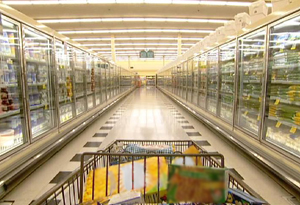
Photo: Food, Inc.
There's no more personal choice than what you feed your body, but what do you really know about the food you eat? Fat, carbohydrates and calories are listed on every label, but where that food comes from, what's been added and what's been removed isn't as easy to see.
How much do you know? Test your knowledge with this Food 101 quiz.
Food, Inc. is a documentary that delves deep into America's food industry to reveal what we're really eating and how it's produced. Some food industry organizations claim the film is misleading, while documentary supports say it is thought-provoking. "You can decide that for yourself. Isn't that wonderful? Because we live in America and you can do that," Oprah says. "But for me, it boils down to making more conscious food decisions. That is my opinion. I saw the movie. That's how I felt. But you need to see it for yourself and make your own decisions because I believe you have a right to know where your food is coming from."
How much do you know? Test your knowledge with this Food 101 quiz.
Food, Inc. is a documentary that delves deep into America's food industry to reveal what we're really eating and how it's produced. Some food industry organizations claim the film is misleading, while documentary supports say it is thought-provoking. "You can decide that for yourself. Isn't that wonderful? Because we live in America and you can do that," Oprah says. "But for me, it boils down to making more conscious food decisions. That is my opinion. I saw the movie. That's how I felt. But you need to see it for yourself and make your own decisions because I believe you have a right to know where your food is coming from."
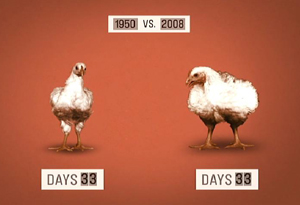
Photo: Food, Inc.
Journalist Michael Pollan—a food expert featured in Food, Inc.—says mass food production is the American way. "We spend less on our food than any people who have ever lived, than any people anywhere on earth—9.5 percent of our income."
A prime example of this is chicken—an animal Michael says has been re-engineered through breeding and diet to produce the breast meat consumers want. Compared to 50 years ago, chickens are now raised and slaughtered in half the time and grow twice as big.
In one way, Michael says this is a great achievement. "Chicken used to be this special occasion, Sunday night dinner. [It] was the expensive meat," he says. "Now it's the cheap meat."
"But you have to understand there's a price to that, and the price is you can only do it with lots of antibiotics," Michael says. "You give all those antibiotics to your animals, they're not gonna work for you when you need them."
A prime example of this is chicken—an animal Michael says has been re-engineered through breeding and diet to produce the breast meat consumers want. Compared to 50 years ago, chickens are now raised and slaughtered in half the time and grow twice as big.
In one way, Michael says this is a great achievement. "Chicken used to be this special occasion, Sunday night dinner. [It] was the expensive meat," he says. "Now it's the cheap meat."
"But you have to understand there's a price to that, and the price is you can only do it with lots of antibiotics," Michael says. "You give all those antibiotics to your animals, they're not gonna work for you when you need them."
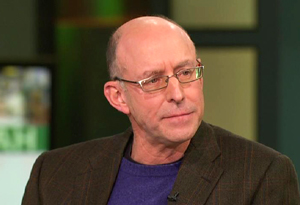
Mass-produced foods also line the shelves of nearly every grocery aisle. "A lot of what you see in the supermarket I would argue is not really food," Michael says. "It's what I call edible, food-like substances."
These products comprise of what Michael calls the "Western diet." "It was really invented about a hundred years ago. It means lots of processed food and meat, lots of added fat and sugar," he says. "Lots of everything except fruits, vegetables and whole grains."
Though some foods are engineered to be fat-free, Michael says it's important to note many of these products swap fat for sugar. "There are now 99 percent fat-free yogurts that have more calories than full-fat yogurt because of sugar," he says. "That's why [during] this low-fat kick we've been on for 40 years, we've gotten really fat."
These products comprise of what Michael calls the "Western diet." "It was really invented about a hundred years ago. It means lots of processed food and meat, lots of added fat and sugar," he says. "Lots of everything except fruits, vegetables and whole grains."
Though some foods are engineered to be fat-free, Michael says it's important to note many of these products swap fat for sugar. "There are now 99 percent fat-free yogurts that have more calories than full-fat yogurt because of sugar," he says. "That's why [during] this low-fat kick we've been on for 40 years, we've gotten really fat."
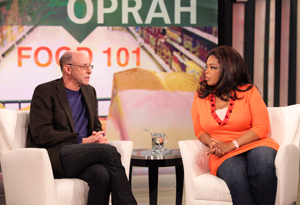
Even if you think you're making smart choices, Michael says the processed foods you buy at the store may affect your health. "Before the Western diet comes in, which is around the turn of the last century, populations did not have high levels of heart disease, type 2 diabetes, obesity, all these diseases," he says.
Although "real" food is often more expensive, Michael says you either pay for real food now—or pay the doctor later. In 1960, Michael says 18 percent of our national income was spent on food, and only 5 percent on healthcare. Today, he says 9 percent of our income is spent on food and a whopping 17 percent on healthcare. "The less we spend on food, the more we spend on healthcare," he says.
Although "real" food is often more expensive, Michael says you either pay for real food now—or pay the doctor later. In 1960, Michael says 18 percent of our national income was spent on food, and only 5 percent on healthcare. Today, he says 9 percent of our income is spent on food and a whopping 17 percent on healthcare. "The less we spend on food, the more we spend on healthcare," he says.
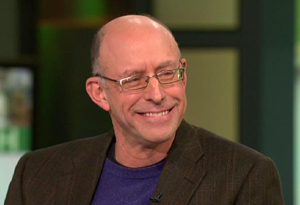
In his personal life, Michael says he eats just about anything—as long as it's real food. "I think cooking is really key because it's the only way you're going to take back control of your diet from the corporations who want to cook for us," he says. "The fact is, so far corporations don't cook that well. They tend to use too much salt, fat and sugar—much more than you would ever use at home."
Michael says his own approch to eating is simple. "I've boiled it down to seven words: Eat food. Mostly plants. Not too much."
When Michael does eat meat, he says prefers grass-fed beef. "I'm very picky about the meat I eat," he says. "I eat grass-fed beef, which is now becoming more common. Yes, it's still more expensive, but it's a very sustainable product."
When he's buying dairy, Michael looks for pastured dairy—milk from grass-fed cows. "It's got more beta carotene, more omega-3s, all this kind of stuff."
Michael also likes to buy produce from farmer's markets. "Getting out of the supermarket when we can is a very important part of learning where your food comes from," he says. "Ask the farmer."
Michael says his own approch to eating is simple. "I've boiled it down to seven words: Eat food. Mostly plants. Not too much."
When Michael does eat meat, he says prefers grass-fed beef. "I'm very picky about the meat I eat," he says. "I eat grass-fed beef, which is now becoming more common. Yes, it's still more expensive, but it's a very sustainable product."
When he's buying dairy, Michael looks for pastured dairy—milk from grass-fed cows. "It's got more beta carotene, more omega-3s, all this kind of stuff."
Michael also likes to buy produce from farmer's markets. "Getting out of the supermarket when we can is a very important part of learning where your food comes from," he says. "Ask the farmer."

In his 20 years of reporting on food, Michael has picked up a number of rules to eat by. They're now collected in an eater's manual, Food Rules. His guidelines to good eating include:
1: Eat food.
2: Don't eat anything your great-grandmother wouldn't recognize as food.
7: Avoid food products containing ingredients that a third-grader cannot pronounce.
13: Eat only foods that will eventually rot.
39: Eat all the junk food you want as long as you cook it yourself.
"It's not that hard to eat well if you're willing to put a little more time into it, a little more thoughtfulness into it and, yes, a little bit more money," he says.
More on Michael's food rules
1: Eat food.
2: Don't eat anything your great-grandmother wouldn't recognize as food.
7: Avoid food products containing ingredients that a third-grader cannot pronounce.
13: Eat only foods that will eventually rot.
39: Eat all the junk food you want as long as you cook it yourself.
"It's not that hard to eat well if you're willing to put a little more time into it, a little more thoughtfulness into it and, yes, a little bit more money," he says.
More on Michael's food rules
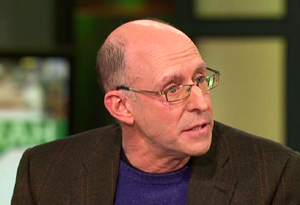
In America, it's often cheaper for a family to eat fast food than purchase fresh produce. Michael says federal agricultural policies are to blame."We subsidize the fast food in the form of the $56 billion we spent over the last 10 years to subsidize corn, soy, wheat—just a handful of crops," he says. "We don't do anything to subsidize fresh produce."
This issue extends much farther than your local drive-thru. It's also affecting our local supermarkets. Michael says experiments have found that $1 can buy you 1,250 calories worth of food in processed food aisles. "Take the same dollar to the produce aisle? You will get only 250 calories of broccoli or carrots," he says. "We've made it rational to eat badly."
This issue extends much farther than your local drive-thru. It's also affecting our local supermarkets. Michael says experiments have found that $1 can buy you 1,250 calories worth of food in processed food aisles. "Take the same dollar to the produce aisle? You will get only 250 calories of broccoli or carrots," he says. "We've made it rational to eat badly."

The average American eats fast food four times a week, but there are chains with a conscience. In 1993, Steve Ells opened the very first Chipotle Mexican restaurant. "I think fast food to most people means cheap, highly processed," he says. "At Chipotle, it's just the opposite. Everything at Chipotle is fresh, never frozen, with the exception of corn."
Steve says 45 percent of Chipotle's beans are organic, and restaurants buy produce from local family farmers in the months it's available.
Chipotle also serves more naturally raised meat than any other restaurant company in the country. In 2010, the chain expects to serve about 70 million pounds of meat. One hundred percent of its chicken and pork are naturally raised, with beef at 60 percent. "These make for better tasting meats and better for the environment," Steve says.
Steve's dedication to fresh food is paying off. Chipotle serves 700,000 people a day and saw more than $1 billion in sales in 2009. "Access to sustainably raised food shouldn't be a luxury," he says. "It should be an everyday occurrence."
Steve says 45 percent of Chipotle's beans are organic, and restaurants buy produce from local family farmers in the months it's available.
Chipotle also serves more naturally raised meat than any other restaurant company in the country. In 2010, the chain expects to serve about 70 million pounds of meat. One hundred percent of its chicken and pork are naturally raised, with beef at 60 percent. "These make for better tasting meats and better for the environment," Steve says.
Steve's dedication to fresh food is paying off. Chipotle serves 700,000 people a day and saw more than $1 billion in sales in 2009. "Access to sustainably raised food shouldn't be a luxury," he says. "It should be an everyday occurrence."
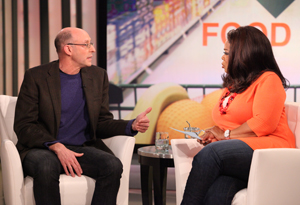
Michael says Steve is proof that fast food outlets can serve sustainable food and be successful. For a real change to happen, however, Michael says federal policy needs to change. "We're going to have to change the way we support farmers and encourage them to grow real food," he says. "People need to decide for themselves."
You can help. "We all can vote with our forks. We get three votes a day," Michael says. "You don't have to get every one of them right. But if you get one of them right a day, if you vote for food that has been sustainably grown or humanely grown, whatever your values are, ... you will change the food system. It's happening now."
Michael Pollan on how to get real food in your daily diet
Why Alicia Silverstone embraced a vegan lifestyle
One woman's attempt to buy organic on a budget
You can help. "We all can vote with our forks. We get three votes a day," Michael says. "You don't have to get every one of them right. But if you get one of them right a day, if you vote for food that has been sustainably grown or humanely grown, whatever your values are, ... you will change the food system. It's happening now."
Michael Pollan on how to get real food in your daily diet
Why Alicia Silverstone embraced a vegan lifestyle
One woman's attempt to buy organic on a budget



